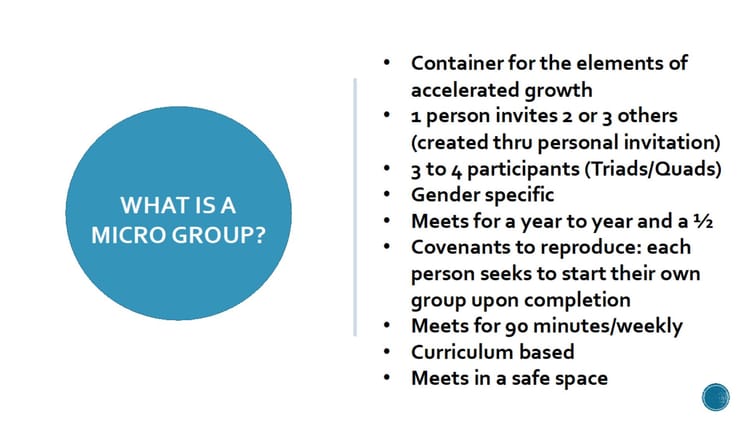Why are Definitions Important?

Definitions, when understood and shared, provide a common language. The more clearly important terms are understood and then shared, the better the communication related to those terms. In our case, when speaking about making disciples, we need to be speaking the same disciplemaking language in order to be aligned in our disciplemaking efforts. We begin by defining disciple, then discipleship, disciplemaking and disciplemaker. We conclude this section by clarifying the desired destination.
Who is a Disciple?
Discipleship.org is a collaborative international community of organizations, committed to a disciplemaking lifestyle. They define a disciple as
“a person who is following Jesus, being changed by Jesus and committed to the mission of Jesus.”
This definition is taken from Matthew 4:19.
“Follow Me and I will make you fishers of men.”
The Amplified version of this verse provides a helpful elaboration.
And [Jesus] said to them,
“Follow Me [as My disciples, accepting Me as your Master and Teacher and walking the same path of life that I walk], and I will make you fishers of men.”
A disciple is someone who is following Jesus,
being changed by Jesus,
committed to the mission of Jesus
and motivated by the love of Jesus.
In other words, a disciple is someone who carries out the
Great Commission with a Great Commandment heart.
What is discipleship? Discipleship is a lifelong process of dying to self while allowing Christ to come alive in us. Most western churches, while convinced that they should be making disciples, attempt to use programs, such as a discipleship course, to produce them. With programs/courses the focus is on the transfer of information usually from a pastor, or other teacher, to new believers. Too often churches expect new believers, once they have completed the discipleship course, to then behave as mature Christians.
Discipleship is not about the transfer of information, but about spiritual transformation. Spiritual growth occurs over time and centers on becoming increasingly Christlike through the work of the Holy Spirit (See 2 Cor 3:18).
As such, discipleship is not a program but a daily process of denying ourselves and taking up our crosses (Luke 9:23) and allowing the Holy Spirit to transform us from within that we may increasingly serve one another in love (Gal 5:13)
What is disciplemaking?
Disciplemaking is “an intentional relationship in which we walk alongside other disciples in order to encourage, equip, and challenge one another in love to grow toward maturity in Christ. It also includes equipping the disciple to make disciples who make disciples.” (Discipleship Essentials, p. 3).
For now, observe that disciples walk alongside each other to encourage one another to be better followers of Jesus, walking by means of the supernatural power of the Holy Spirit, not by more and better human effort to reach an impossible goodness.
They equip one another to do so by demonstrating what it looks like to be prayerful, to use spiritual gifts in service to others, and to love one another as Jesus loves us. From this definition we see the importance of modeling the life of a Spirit-led, Spirit-enabled, follower of Christ. Reproducing disciplemakers join the Apostle Paul who in 1 Cor 11:1 stated “Be imitators of me, as I am of Christ” (ESV).
Who is a disciplemaker?
A disciplemaker is a “self-initiating, reproducing, fully devoted follower of Jesus Christ.” (Transforming Discipleship, p. 71).
Disciplemakers know how to make disciples because they have been discipled. Disciplemakers have adopted disciplemaking as a lifestyle. They have internalized the mission of Jesus. His mission has become their mission. No one needs to tell them to go and make disciples because it has become their life’s mission.
What is the desired destination? The desired destination for all churches should be to be a Great Commission church—a church whose core mission is to make disciples who make disciples. Reproducible disciplemaking reaches “critical mass” when about 20% of the members of a church reproduce disciples as a lifestyle. This critical mass of equipping disciplemakers provides the momentum needed to move the church toward becoming a church whose core mission is to make disciples who make disciples.
Once the command to make reproducing disciples is embraced by church leaders and there is a common understanding of key disciplemaking terms, the next step toward fulfilling the Great Commission is to determine where a church is along the pathway to becoming a disciplemaking church.
Therefore, we move from disciplemaking definitions to specific characteristics, or symptoms, of a disciplemaking church. Though there are certainly additional characteristics that could be examined, the following seven, when present, have been observed to be essential to sustained reproducible disciplemaking.
7 Essentials to Sustained Reproducible Disciplemaking
- Members as Ministers: Church members are proactive, self-initiating, ministers. They use their spiritual gifts for the benefit of the other members of the church (See 1 Cor 12:7 NLT).
- Spiritual Disciplines: Church members lead a disciplined Christian life. They engage in spiritual growth activities such as: daily Bible reading, study and prayer, group Bible study, and spiritual mentoring relationships. (See Heb 6:1 and 2 Tim 3:1-17)
- Holistic Faith: Church members view their faith in Christ as something that they carry into every area of life: family, workplace, community, and church.
- Transformed Life. Church members live a “transformed” life that is characterized by godly beliefs and behaviors that come from a renewed mind. (See Romans 12:2, also 1 Pet 2:11-12 and 1 Pet 2:9)
- Church Membership. Church members believe that belonging to a church is essential to becoming a mature Christian because the Church is the Body of Christ. (See 1 Cor 12:12-13, and 27)
- Knowledge of the Bible. Church members have a good understanding of the Bible. They live their lives based on the truth revealed in Scripture. The Word of God is to the soul what food is to the body (See Matt 4:4, ESV.)
- Sharing the Gospel. Church members spend time building friendships with non-Christians for the purpose of sharing Christ with them. (See Acts 1:8 and Rom 1:16, ESV)
Where is the Church on the path?
So generally, where is the Church on the path toward becoming a disciplemaking mission? A study conducted by Grey Matter Research for Discipleship.org and Exponential.org in 2020 examined the current state of disciplemaking in the United States. Here are their key findings.
- Fewer than 5% of churches in the US have a reproducing disciplemaking culture.
- Churches in the US do not share a common definition of key disciplemaking terms such as disciple, discipleship, and disciplemaking.
- Pastors in the US often overrate the effectiveness of their church’s disciplemaking efforts.
The Current State of Disciplemaking Churches in the US
- Members as Ministers. The majority of church members are passive recipients. They rely on the pastors and staff to do the work of the church. Pareto’s 80/20 rule appears to apply as 80% of the church sits and watches the remaining 20% do all the work and give most of the money.
- Spiritual Disciplines. A small percentage of church members invest in spiritual growth practices. Only 10% of those who claim to be Christians read their Bible daily (American Bible Society, State of the Bible USA, 2022).
- Holistic Faith. Many church members fail to acknowledge and accept Jesus’ right to govern every area of life. A 2022 Barna study found that 56% of Christians believe their spiritual lives are entirely private.
- Transformed Life. Recent research suggests that the majority of church members live lives that are not much different from unchurched people. Sixty-seven percent believed that the highest goal is to enjoy life as much as possible (Barna, 2015).
- Church Membership. The reality is that the majority of those who claim to be Christians, view belonging to a church as optional and unnecessary for spiritual growth as a disciple of Jesus. A 2020 study by LifeWay Research found that 39% of those surveyed believed worshipping alone—or with one’s family—is a valid replacement for regular church attendance. Many believe that study and serving with other Christians is not necessary for spiritual growth.
- Knowledge of the Bible. The majority of church members are biblically ignorant. A 2017 LifeWay Research study found that only 20% of those surveyed had read the entire Bible and 30% had read only several passages. A 2019 Pew Research Center Study in the U.S. found that the Protestants surveyed provided correct answers to 7 easy questions about the Bible only 67% of the time and evangelicals only 74%. For example,
“Which Bible figure is most closely associated with killing an enemy by slinging a stone?” David, Isaiah, Joshua, or Solomon.
Then, when asked basic questions about Christianity, Protestants were correct 53% of the time and evangelicals 59%. For example,
“What is commemorated on Easter Sunday?” Resurrection, Ascension, Crucifixion, Last Supper.
- Sharing the Gospel. The reality is that the majority of church members are intimidated by the thought of sharing the gospel. In the US the percentage of Christians who share their faith is decreasing. As noted, 56% of Christians claim that spiritual growth is a completely private matter. Sharing faith in Christ is becoming more difficult in the West as many do not believe that there is absolute truth, citing that there are many ways to God.
START HERE: Assess Your Health

Assessments of the health of disciplemaking both in the US and in other parts of the world using an assessment tool based on the seven characteristics described above, suggest that the Church, as a whole, is doing a poor job of making disciples who reproduce. A summary of the current state of disciplemaking in the US Church would read as follows:
In contrast to the above ideal description of the church, the reality is more like:
- Most of the members of many churches in the US do not use their spiritual gifts for the benefit of those in their church.
- They do not believe that belonging to a community of faith is necessary for spiritual growth.
- They do not read their Bibles or engage in other spiritual disciplines and so are ignorant of the truths it contains.
- They do not seek to live lives transformed by the Holy Spirit and so live lives not much different than those of the unchurched.
- They do not share their faith and so they do not seek to take it into their workplace or their community.
- They are not self-initiating, reproducing, fully devoted followers of Jesus Christ.
So where do we go from here? A starting point is to examine the symptoms of the state of disciplemaking in your own church. An assessment of the seven symptoms noted above will indicate whether a deeper evaluation is necessary.
A symptomatic assessment is similar to a doctor providing an initial examination of a sick child to determine if further tests are needed. An assessment tool based on the seven symptoms along with instructions for its use is provided in Appendix A of GO MICRO: A Guide to Transforming and Multiplying Disciples of Jesus Through MicroGroups. You may find it helpful to review and complete the assessment before going further.





Member discussion